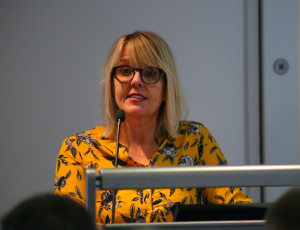Pioneering Santander drive to minimise psychological impact of COVID-19 applauded by CWU
Telecoms & Financial Services May 19 2020

Industry-leading efforts by Santander to mitigate the negative psychological impact of the coronavirus pandemic on its workforce have been hailed by the CWU as a template that other employers would do well to follow.
The Bank’s ground-breaking approach to supporting the mental wellbeing of employees has been influenced by expert-led modelling that suggest a combination of uncertainty at work, social isolation, potential financial concerns and rapid changes in family life could lead to an upsurge in the prevalence of mental ill health across society.
Responding to modelling that suggested that, even in pre-COVID-19 times, around 15% of individuals were at risk of having their mental wellbeing placed ‘at risk’ by a combination of stress, anxiety and depression – with 5% either only just ‘surviving’ or seriously struggling – the Bank had already introduced a comprehensive mental health strategy backed up with an innovative app called ‘Thrive’ which was this year shortlisted for an industry award.
During the current pandemic, however, experts believe that percentage of individuals whose mental wellbeing could be ‘at risk’ has quadrupled to around 60 per cent, with the percentage of those who can only be classed as ‘surviving’, which includes those at serious risk, also jumping four-fold to 20%.
Left unchecked, and without the ‘right cultural actions’ being taken at the right time, it has been predicted the percentage of people in that most vulnerable group could rapidly double again to an astonishing 40% – with those deemed to be ‘thriving’ mental health wise correspondingly plummeting from 80% in pre-COVID times to just 15% in an unsupported ‘new normal’.
It’s these alarming statistical projections that lie behind Santander’s radical new approach to supporting employee’s psychological wellbeing in times that lie ahead – a move the Bank believes is not just the ‘right thing to do’ in terms of its duty of care to staff, but also will help prevent longer term declines in job satisfaction and increased incidence of employee burnout.
On top of the recruitment of a psychologist and epidemiologist to provide specialist advice to the Bank on how policies, processes and the support available to staff can be shaped mitigate these risks initiatives delivered in recent weeks have included:
- The launch of a new “Coronavirus Hub” on the intranet, also accessible from personal devices, to provide a “one-stop shop” for all COVID-19 related information, communications, advice and policies
- The mass surveying of staff to identify the ‘top needs ‘ and concerns of employees, that are then informing company decisions on a wide range of issues.
- The creation of a “Stay in Touch” website – to provide interactions around wellbeing and social elements involving employee participation.
- The provision of comprehensive advice and information designed to support personal resilience, home-schooling and to tackle potential feelings of isolation amongst home workers.
- The provision of a virtual counselling service via the Employee Assistance Programme
- Opportunities to access live chat with a psychologist being promoted to staff

Rising to a physical as well as a mental challenge
Well over 50% of Santander’s UK employees are now working from home – 7,500 more than was previously the case.
Within the contact centre environment, around 40% of advisors are now homeworking, 20% on site – socially distanced with PPE and cleaning materials in addition to buildings being ‘fogged’ every week – and the remainder not attending work for a variety of reasons, including vulnerability, shielding and sickness.
Santander has committed not to draw any public funding from the Government’s Job Retention Scheme and is providing its own support arrangements to employees and former employees agreeing eligibility criteria with the unions. It has also committed that all employees, whatever their circumstances, will continue to be paid their full contractual hours during the pandemic.
This, along with a new one-off Covid-19 related holiday scheme agreed with CWU, provides employees with more flexibility to manage leave this year. It enables the exceptional carry forward of unused annual leave from employees 2020 annual leave entitlement to 2021 or 2022.
Further to joint agreement with the unions, steps have also been taken to review how disciplinary and grievance cases can best be supported, agreeing new ways, such as video sessions, to adapt to these exceptional times.
 Last week CWU assistant secretary Sally Bridge was invited onto a one-to-one conference call with Santander UK Chief HR Officer, Enrique Alvarez, at which the Bank’s wide-ranging response to the challenges posed by COVID-19 were discussed in detail.
Last week CWU assistant secretary Sally Bridge was invited onto a one-to-one conference call with Santander UK Chief HR Officer, Enrique Alvarez, at which the Bank’s wide-ranging response to the challenges posed by COVID-19 were discussed in detail.
During the course of that conversation the need for a cautious response to any loosening of the current lockdown was agreed. Crucially, the CWU received welcome assurances that the Bank will maintain its current approach for the foreseeable future, and any ‘return to work’ will be carefully managed and monitored to ensure maximum occupancy levels of no more than 30% across its major sites – allowing for the continuation of social distancing.
“The way Santander has gone out of its way to do the right thing by its employees is heart-warming,” stresses Sally. “That includes the extent to which the Bank has involved the CWU at every step of the journey, with literally hours and hours of meaningful consultation on the fine details of an enlightened company response.
“This has allowed us to conclude agreements on wide range of issues that place our members in Santander in the best possible position to deal with the enormous stresses and strains thrown up by the current crisis – with an industry-leading company response to protecting their mental wellbeing working in tandem with the considerable efforts being made to safeguard employees’ physical health.
“I firmly believe that, when we finally emerge from this terrible pandemic, firms will be judged by the way they treated their employees in the time of coronavirus, and there will be some that come out well and others that don’t. I’m pleased to say that, as things stand, Santander is firmly in the former category.”

